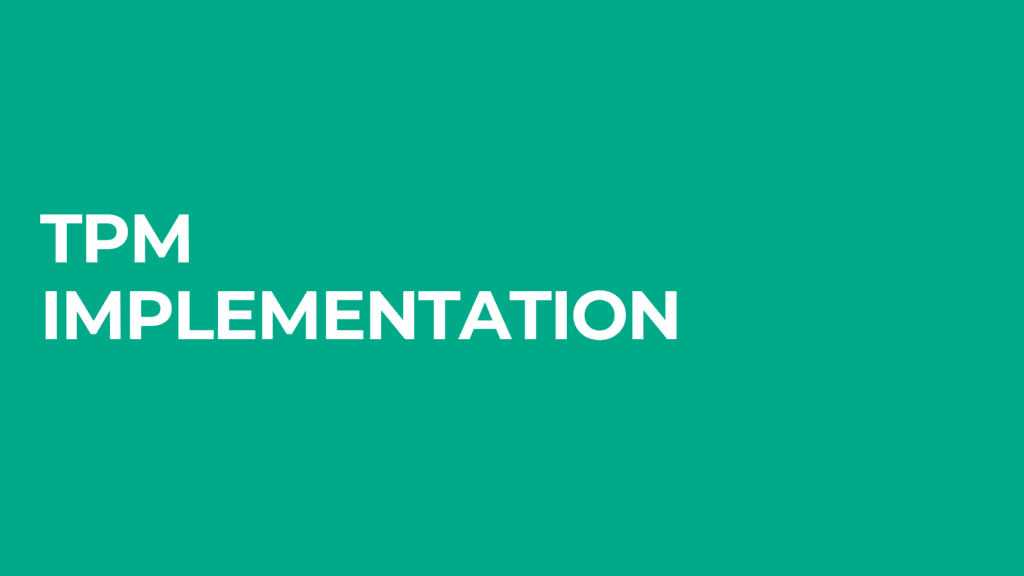
In today's competitive business landscape, companies are constantly seeking ways to enhance their operational efficiency, reduce costs, and improve overall productivity.
Total Productive Maintenance (TPM) has emerged as a powerful methodology to address these challenges and optimize manufacturing processes. In this article, we will delve into the world of TPM, exploring what it is, its significance, and why businesses are increasingly turning to TPM consultants in India and beyond to implement this transformative approach.
As GreenDot Management Consultants, we're committed to providing you with an even more in-depth understanding of TPM Consultants and their pivotal role in enhancing industrial processes. In this extended guide, we'll delve further into various facets of TPM consulting, from qualifications and expertise to the tangible benefits, stages of implementation, and the financial aspects of hiring TPM Consultants.
Unlocking the Power of TPM Consultants: Your Ultimate Guide
In the ever-evolving landscape of business and industry, achieving operational excellence is a goal that every organization aspires to reach. Total Productive Maintenance (TPM) stands as a beacon in this journey, and TPM consultants are the guiding stars that help businesses navigate through the intricate realms of maintenance, productivity, and efficiency. In this comprehensive guide, we will delve deep into the world of TPM consultants, their significance, and how they can elevate your organization to new heights of success.
At GreenDot Management Solutions, we recognize that proficient TPM Consultants possess a unique blend of technical and strategic proficiencies. Typically, they are seasoned engineers with extensive backgrounds in maintenance, reliability, and continuous improvement. What sets them apart is not just their technical prowess but also their robust problem-solving abilities and exceptional communication skills, which facilitate effective collaboration with teams across all organizational hierarchies.
Understanding TPM: A Brief Overview
Before we dive into the role of TPM consultants, it's crucial to grasp the fundamentals of TPM itself. TPM is a holistic approach to maintenance and production management that aims to maximize the overall equipment effectiveness (OEE) of an organization. It goes beyond traditional maintenance practices and fosters a culture of continuous improvement.
The Pillars of TPM
To fully appreciate the impact of TPM consultants, let's explore the key pillars of TPM:
The Eight Pillars of TPM
To achieve these goals, TPM relies on eight key pillars:
- Autonomous Maintenance: This pillar focuses on empowering operators to take care of their machines. It involves regular cleaning, inspection, and minor maintenance tasks by the operators themselves.
- Planned Maintenance: Scheduled and systematic maintenance activities are crucial to prevent breakdowns and ensure machines are in optimal condition.
- Quality Maintenance: TPM emphasizes maintaining product quality by preventing defects in the manufacturing process.
- Focused Improvement: Encouraging employees to identify and solve problems in their work areas to continuously improve processes and equipment.
- Early Equipment Management: Ensuring that new equipment is designed with maintainability in mind, and that maintenance requirements are considered from the beginning.
- Education and Training: Providing the necessary skills and knowledge to employees so they can effectively contribute to TPM activities.
- Safety, Health, and Environment: Promoting a safe and healthy work environment is fundamental to TPM, as it ensures the well-being of employees and the sustainability of operations.
- Administrative and Office TPM: Expanding TPM principles beyond the shop floor to administrative and office processes, enhancing efficiency throughout the organization.
Now that we've established the foundations of TPM, let's explore the invaluable role played by TPM consultants in your organization's journey towards operational excellence.
Why Businesses Need TPM Consultants
Businesses need TPM Consultants for several reasons & we have competancy to help you grow.
1. Expertise and Guidance
TPM consultants bring a wealth of knowledge and experience to the table. They are well-versed in TPM methodologies and best practices, making them invaluable resources for organizations looking to implement TPM effectively.
2. Tailored Implementation
No two organizations are the same, and TPM consultants understand this well. They customize TPM implementation strategies to align with the unique needs and challenges of your business.
3. Training and Development
One of the primary responsibilities of TPM consultants is to educate and train your workforce. They conduct workshops, seminars, and hands-on tpm training sessions to equip your employees with the skills needed for TPM success.
4. Performance Monitoring
Consultants continuously monitor the progress of TPM implementation, tracking key performance indicators (KPIs) and making adjustments as necessary to ensure the desired outcomes are achieved.
5. Problem Solving
When obstacles arise, TPM consultants are adept at problem-solving. They use data-driven approaches to identify root causes and implement corrective actions swiftly, minimizing disruptions in your operations.
The Benefits of Engaging TPM Consultants
Investing in TPM consultants can yield a multitude of benefits for your organization. Here are some compelling reasons to consider their services:
1. Enhanced Equipment Reliability
By implementing TPM practices under the guidance of consultants, you can significantly improve the reliability and lifespan of your equipment, reducing maintenance costs and downtime.
2. Increased Productivity
TPM leads to optimized processes and streamlined workflows. As a result, your organization can achieve higher levels of productivity, allowing you to meet customer demands efficiently.
3. Improved Quality
Quality is a hallmark of TPM. Consultants help you implement stringent quality control measures, ensuring that your products or services consistently meet or exceed customer expectations.
4. Cost Savings
Through proactive maintenance and reduced downtime, TPM consultants contribute to substantial cost savings in the long run. This includes savings on maintenance, repairs, and energy consumption.
5. Engaged Workforce
TPM fosters a culture of engagement and ownership among employees. TPM consultants play a vital role in nurturing this culture, leading to a more motivated and productive workforce.
Read More on abnormalities - 7 types of abnormalities in tpm : understading common issues
The Scope of Services Offered by TPM Consultants
TPM Consultants offer a wide range of services, including:
- TPM Audits and Assessments: Detailed evaluations of existing processes and equipment.
- Strategy Development and Implementation: Tailored TPM strategies and action plans.
- Stages of TPM Implementation: Guiding your organization through the phases of TPM adoption.
- KPIs for TPM Success: Establishing key performance indicators to measure progress.
- Real-World Results: Demonstrating successful TPM implementations through case studies.
How TPM Consultants Assess Existing Processes
A Closer Look at TPM Audits and Assessments
TPM Consultants conduct comprehensive audits and assessments to identify areas for improvement. They analyze equipment condition, maintenance practices, and employee involvement. These assessments form the basis for creating a personalized TPM strategy.
How TPM Consultants Develop and Implement Strategies
TPM Consultants work closely with your teams to develop and implement strategies, focusing on:
Strategies for Improving Equipment Efficiency
- Autonomous Maintenance: Empowering operators to handle routine equipment maintenance.
- Planned Maintenance: Creating schedules and procedures for systematic maintenance.
- Quality Maintenance: Reducing defects and enhancing product quality.
- Training and Education: Ensuring all employees understand their roles in TPM.
- Early Equipment Management: Improving the design and installation of equipment.
- Administrative and Office TPM: Extending TPM principles to office processes.
The Stages of TPM Implementation
Successful TPM implementation typically progresses through five stages:
- Awareness: Introduction to TPM principles.
- Training and Education: Workforce understanding of TPM.
- Pilot Implementation: Implementing TPM on a small scale.
- Rollout: Expanding TPM across the organization.
- Sustainment: Maintaining and continuously improving TPM practices.
Read more - 12 steps of tpm implementation comprehensive guide
Key Performance Indicators (KPIs) for TPM Success
KPIs are vital for measuring the effectiveness of TPM practices. Common KPIs include OEE, equipment breakdown rates, mean time between failures, and overall maintenance costs.
Learn more : Maximizing the Efficiency with tpm understading 16 losses and how to reduce them?
How to Choose the Best TPM Consultant for Your Business
Selecting the right TPM Consultant is crucial. Consider asking potential consultants:
Tips for Selecting the Right TPM Consultant
- Experience: In-depth TPM knowledge and a track record of successful implementations.
- Customization: Ability to tailor solutions to your unique needs.
- Communication Skills: Effective communication and collaboration with your team.
- References: Proven success and positive testimonials from previous clients.
Are you Looking for tpm training
The Financial Aspects of Engaging GreenDot Management Solutions for TPM Consultation
Opting for GreenDot Management Solutions' TPM consultancy services necessitates a financial commitment, but it's more than just an expenditure—it's an investment that yields substantial returns. Our team, deeply rooted in a strong technical background, excels in identifying cost-saving opportunities and enhancing operational efficiency.
How GreenDot's TPM Consulting Drives Remarkable Cost Savings
Through the collaborative efforts of our highly technical team, we focus on reducing downtime, elevating equipment reliability, and enhancing productivity. The result is a remarkable reduction in costs, demonstrating our extreme dedication to delivering tangible results.
ROI Achieved through GreenDot's TPM Consulting Services
Our TPM consulting services consistently produce an impressive Return on Investment (ROI). The financial gains realized far surpass the initial consulting costs, underscoring our unwavering commitment to delivering outcomes that speak to our technical expertise and result-oriented approach.
Video Success stories
- Result of Our consulting Service - we have doubled our production
- Result of OEE implementaiton : increased productivity by 20% just in 3 months
3. Result of De bottlenecking : Delivery time increaed by 2 weeks, overtime reduced by 80,000 per Months
Conclusion
In conclusion, TPM consultants are the bridge between your organization and the world of Total Productive Maintenance. Their expertise, guidance, and commitment to excellence can propel your business to new heights of success. As you embark on your TPM journey, remember that investing in TPM consultants is an investment in the future of your organization. With their support, you can unlock the full potential of TPM and achieve operational excellence like never before. So, take the first step towards a brighter future – engage TPM consultants today and watch your organization thrive.
Q1: What industries can benefit from TPM Consulting?
A1: TPM Consulting is not limited to a specific industry. It has proven effective in manufacturing, healthcare, logistics, and many other sectors. Any industry that relies on equipment and machinery can benefit from TPM practices.
Q2: Are TPM Consultants certified professionals?
A2: Yes, TPM Consultants often hold certifications from reputable organizations. These certifications validate their expertise in TPM principles and methodologies.
Q3: How long does it typically take to see results from TPM implementation?
A3: The timeline for seeing results from TPM implementation can vary based on the complexity of the organization's processes and the commitment to TPM practices. In some cases, improvements may be noticeable within a few months, while in others, it might take a year or more.
Q4: What role does technology play in TPM Consulting?
A4: Technology is integral to TPM Consulting. It enables real-time equipment monitoring, data analysis, and predictive maintenance. TPM Consultants leverage technology to optimize maintenance strategies and improve overall efficiency.
Q5: How can organizations measure the success of TPM implementation?
A5: Success in TPM implementation is typically measured through key performance indicators (KPIs) such as equipment uptime, maintenance costs, defect rates, and overall productivity. Organizations track these metrics to gauge the impact of TPM strategies.

